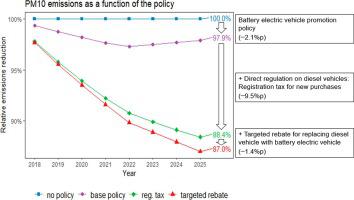Transportation Research Part D: Transport and Environment ( IF 7.3 ) Pub Date : 2021-02-20 , DOI: 10.1016/j.trd.2021.102758 Hyunhong Choi , Yoonmo Koo

|
Quantifying environmental benefits from battery electric vehicles (BEVs) requires an understanding of the long-term substitutional relationships among different vehicle technologies. This study analyzes how BEV promotion can contribute to reductions in particulate matter (PM) emissions in Korea and investigates effective long-term policy options. Using a choice model, this study simulates consumers’ vehicle replacement behavior under various policy scenarios from 2018 to 2025. The results show that BEV promotion alone has limited effectiveness at reducing PM emissions because BEV purchases were predominantly made by gasoline vehicle owners while diesel vehicles are the key source of emissions. This finding is significant because investment in BEV promotion in Korea specifies PM emissions reductions as their core objective and legal basis. Investigation of additional policy options suggests that the combination of direct regulations on diesel vehicles and a targeted rebate to promote substitution between diesel vehicles and BEVs can reduce PM emissions by ~13%.
中文翻译:

推广电动汽车对减少颗粒物排放的有效性
量化电动汽车(BEV)带来的环境效益需要了解不同汽车技术之间的长期替代关系。这项研究分析了BEV推广如何有助于减少韩国的颗粒物(PM)排放,并研究了有效的长期政策选择。该研究使用选择模型模拟了从2018年到2025年在各种政策情景下消费者的车辆更换行为。结果表明,仅BEV促销在减少PM排放方面的效果有限,因为BEV的购买主要是汽油车主购买的,而柴油车是排放的主要来源。这一发现意义重大,因为在韩国开展BEV推广的投资将减少PM排放作为其核心目标和法律依据。











































 京公网安备 11010802027423号
京公网安备 11010802027423号